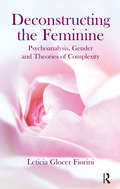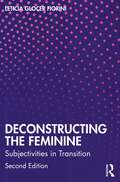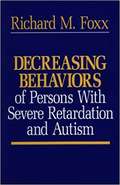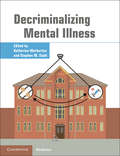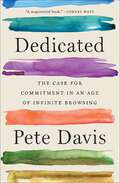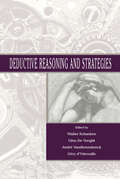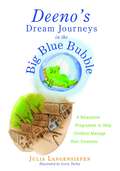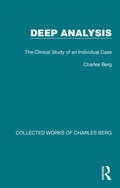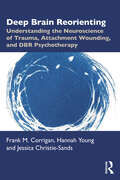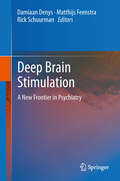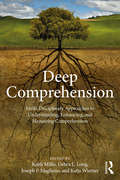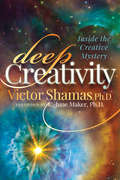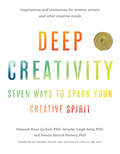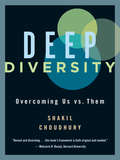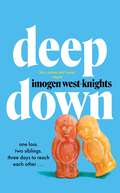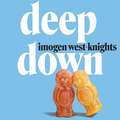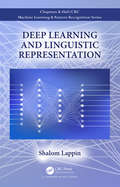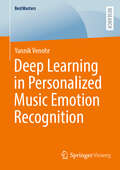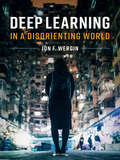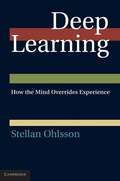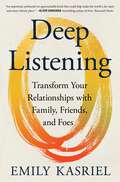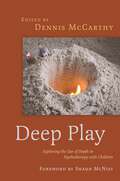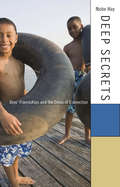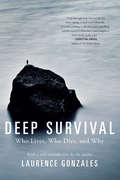- Table View
- List View
Deconstructing the Feminine: Psychoanalysis, Gender and Theories of Complexity
by Leticia Glocer FioriniThe guiding thread of this theoretical review is the illumination of the impasses of binary thought and of the essentialist conceptions of women and the feminine. In this trajectory, the author's ongoing dialogue with Freud is connected with one aspect of his way of thinking: multicentred and complex. The text addresses questions relating to love, sexual desire, maternity, beauty and the passing of time and highlights current debates concerning women, the feminine, and sexual difference as well as some controversial topics that have been discussed throughout the history of the psychoanalytic movement. One of the most relevant subjects is the notion of 'feminine enigma' and the conceptions of the feminine as the negative of the masculine, which means going into the nature-nurture debate, as well as into considerations of the feminine seen as the other of the masculine. The author points out that the notion of 'feminine enigma' is a displacement of the enigmas inherent to the origins, to the finite time of life (the inevitability of death) and to sexual difference.
Deconstructing the Feminine: Subjectivities in Transition
by Leticia Glocer FioriniDeconstructing the Feminine looks beyond impasses of binary thought and essentialist conceptions of women and the feminine from a contemporary perspective.With a multi-centred and complex approach and an ongoing dialogue with Freud, Leticia Glocer Fiorini addresses questions relating to love, sexual desire, maternity, beauty, and the passing of time by reconsidering the gender binary and underlying power relations. Glocer Fiorini’s work highlights current debates concerning women, the feminine, and sexual difference, as well as discussing topics which have caused controversy throughout the history of the psychoanalytic movement. The updated and expanded edition distinguishes between the concept of sexual difference and the category of ‘difference’ as it applies at various heterogenous levels, and includes new approaches reflecting on the ‘feminine enigma’, hysteria, feminine masochism, and masculinity.Deconstructing the Feminine will be of great interest to psychoanalysts in clinical practice and in training, as well as to scholars of gender, sexuality, and women’s studies.
Decreasing Behaviors Of Persons With Severe Retardation And Autism
by Richard M. FoxxThis widely used manual shows how to increase desirable behaviors by using techniques such as shaping, prompting, fading, modeling, backward chaining, and graduated guidance. It offers specific guidelines for arranging and managing the learning environment as well as standards for evaluating and maintaining success. Exercises, review questions, and numerous examples are included. The book is written for special educators, aides, residential staff, and those responsible for designing or evaluating behavioral programs. Often adopted as a supplementary college text.
Decriminalizing Mental Illness
by Stephen M. Stahl Katherine WarburtonReports reveal an increase in the number of individuals with serious mental illness in jails, prisons and forensic hospitals. Despite the wide-ranging and devastating consequences of this 'criminalization' of mental illness, there remains a lack of information on the subject as well as on the provision of care for these patients. This important new book fills a gap in the literature by examining topics such as: the history and policy factors related to criminalization; original research on forensic populations; pharmacological and psychological treatment strategies; and principles and guidelines for diversion out of the criminal justice system. Contributions from leading experts in the field further our understanding of this important subject, offering advice on how to provide humane care for patients. A must have for all mental health clinicians including psychiatrists, psychologists, social workers, rehabilitation therapists, and mental health nurses. A useful tool for mental health administrators and policy makers.
Dedicated: The Case for Commitment in an Age of Infinite Browsing
by Pete DavisA profoundly inspiring and transformative argument that purposeful commitment and civic engagement can be a powerful force in today&’s age of restlessness and indecision.Most of us have had this experience: browsing through countless options on Netflix, unable to commit to watching any given movie—and losing so much time skimming reviews and considering trailers that it&’s too late to watch anything at all. In a book inspired by an idea first articulated in a viral commencement address, Pete Davis argues that this is the defining characteristic of the moment: keeping our options open. We are stuck in &“Infinite Browsing Mode&”—swiping through endless dating profiles without committing to a single partner, jumping from place to place searching for the next big thing, and refusing to make any decision that might close us off from an even better choice we imagine is just around the corner. This culture of restlessness and indecision, Davis argues, is causing tension in the lives of young people today: We want to keep our options open, and yet we yearn for the purpose, community, and depth that can only come from making deep commitments. In Dedicated, Davis examines this quagmire, as well as the counterculture of committers who have made it to the other side. He shares what we can learn from the &“long-haul heroes&” who courageously commit themselves to particular places, professions, and causes—who relinquish the false freedom of an open future in exchange for the deep fulfillment of true dedication. Weaving together examples from history, personal stories, and applied psychology, Davis&’s &“insightful without being preachy…guide to commitment should be on everyone&’s reading list&” (Booklist, starred review).
Deductive Reasoning and Strategies
by Walter Schaeken Gery D'Ydewalle Gino De Vooght Ry D'Ydewalle G Andr VandierendonckThis book brings together both theoretical and empirical research directed toward the role of strategies in deductive reasoning. It offers the first systematic attempt to discuss the role of strategies for deductive reasoning. The empirical chapters correspond well with the main issues in the study of deduction, namely propositional reasoning, spatial reasoning, and syllogistic reasoning. In addition, several chapters present a theoretical analysis of deduction, related to the concept strategy. The book also presents data about the role of strategies for statistical and social reasoning. This book will be of interest to researchers and students of cognitive psychology. It will also be of value to people working in Artificial Intelligence, because it highlights results on how humans use strategies while tackling deductive puzzles.
Deeno's Dream Journeys in the Big Blue Bubble
by Julia LangensiepenDeeno's Dream Journeys in the Big Blue Bubble is a fun and easy-to-use guide to a special relaxation technique for children. Adapted from the system of Autogenics, the six-week programme uses positive affirmations and guided imagery to help children manage their emotions, let go of anxiety and feel calm and confident. Each week, the child is given a new set of 'magic words': a relaxation tool they can draw upon whenever they feel stressed or anxious. An illustrated story based around these words, where the child is asked to imagine they are going on an adventure in a big blue bubble with Deeno the Dinosaur, draws the child into a safe and magical world and guides their minds and bodies into a state of deep, calming relaxation. Suggestions for follow-up practice and creative activities based around that week's words accompany each session, and encourage children to tap into their own imaginations. Separate introductions for parents, teachers and other professionals provide advice on how best to use the technique, whether at home, at school, or elsewhere. There is also a children's introduction, which introduces Deeno and explains the technique in accessible terms. Accessible and engaging, Deeno's Dream Journeys in the Big Blue Bubble is an ideal tool for helping children develop effective relaxation skills in a fun and imaginative way.
Deep Analysis: The Clinical Study of an Individual Case (Collected Works of Charles Berg)
by Charles BergFirst published in 1947, with a second edition in 1950, the original blurb reads: 'This is an illuminating description of a complete Freudian analysis of a single case. From the first interview to the last the reader’s attention is engrossed with the almost-normal personality of the individual who is being analysed. We see his thoughts, philosophy, and emotions gradually unfolding under the application of analytical technique (lightly explained in the second chapter), until – and this is where the book is such a tremendous advance upon the psychological novel – the very springs and mechanisms of his psychic pattern and emotional structure are abundantly and lucidly revealed. We see and understand the hidden depths of the nature of the human mind, and obtain introductory insight not only into normal mental functioning, but into almost all its psychopathic aberrations including frigidity, impotence, love, hate, hysteria, obsessions, and even paranoia and schizophrenia – all in minor degrees an integral part of normality. In spite of this the book is light reading and, though particularly instructive to doctor and professional psychologist, understandable to the average intelligent layman.' This book is a re-issue originally published in 1950. The language used is a reflection of its era and no offence is meant by the Publishers to any reader by this re-publication.
Deep Brain Reorienting: Understanding the Neuroscience of Trauma, Attachment Wounding, and DBR Psychotherapy
by Hannah Young Frank M. Corrigan Jessica Christie-SandsDeep Brain Reorienting introduces a novel, evidence-based approach to the treatment of trauma-related disorders. Steeped in neuroscience, this book builds on recent scientific contributions to the effects of shock, trauma, and neglect on the brain at the deepest levels. Enhanced by detailed case material and underpinned by a strong theoretical framework, the authors give special attention to clinically significant forms of dissociation, as well as attachment wounding and its treatment. This neurobiologically informed focus offers fresh perspectives, reaching beneath the level of cognitive, affective, and defensive components of traumatic responding.Written at the interface of neuroscience and psychotherapy, this book will be invaluable to psychotherapists whose clinical practice is calling for new ways to work with the effects of traumatic experiences. In addition, several hypotheses will appeal to research-oriented psychotherapists and clinically-led researchers in a range of fields.
Deep Brain Stimulation
by Rick Schuurman Matthijs Feenstra Damiaan DenysDeep Brain Stimulation: A New Frontier in Psychiatry provides an overview of current developments and the future possibilities of deep brain stimulation for patients with therapy-refractory psychiatric disorders. The side-by-side presentation of clinical applications and animal research provides a truly translational approach. Also included is a special chapter on the ethical issues involved in deep brain stimulation in psychiatry. Deep brain stimulation of selected brain areas has been shown to result in a substantial improvement of symptoms and quality of life in patients suffering from obsessive-compulsive disorder, major depressive disorder and drug addiction. Although it is still an experimental therapy and the number of psychiatric patients that are treated is low, its effectiveness and safety makes deep brain stimulation the most promising therapy for treating other serious and life-threatening psychiatric conditions.
Deep Brain Stimulation Management
by William J. Marks Jr.This concise guide to deep brain stimulation (DBS) outlines a practical approach to the use of this paradigm-shifting therapy for neurologic and psychiatric disorders. Fully revised throughout, the new edition provides extensive information about the application of DBS to movement disorders, and includes new chapters on DBS to treat epilepsy and psychiatric conditions. With the evolution of surgical techniques for DBS lead implantation, a brand new section focused on interventional MRI approaches is also included. All key aspects of DBS practice are covered, including patient selection, device programming to achieve optimal symptom control, long-term management, and trouble-shooting. It is a guide to be kept in the clinic and consulted in the course of managing patients being considered for, or treated with, DBS. With contributions from some of the most experienced clinical leaders in the field, this is a must-have reference guide for any clinician working with DBS patients.
Deep Comprehension: Multi-Disciplinary Approaches to Understanding, Enhancing, and Measuring Comprehension
by Debra Long Keith K. Millis Joseph Magliano Katja WiemerThis volume provides an overview of research from the learning sciences into understanding, enhancing, and measuring "deep comprehension" from a psychological, educational, and psychometric perspective. It describes the characteristics of deep comprehension, what techniques may be used to improve it, and how deep levels of comprehension may be distinguished from shallow ones. It includes research on personal-level variables; how intelligent tutors promote comprehension; and the latest developments in psychometrics. The volume will be of interest to senior undergraduate and graduate students of cognitive psychology, learning, cognition and instruction, and educational technology.
Deep Creativity: Inside the Creative Mystery
by Victor ShamasDeep Creativity reveals the findings of Victor Shamas’ 30-year exploration of the creative process. Rather than observing creativity in others, he delved into the experience directly in order to uncover hidden truths and break free of common misconceptions. Deep Creativity turns fundamental assumptions about creativity on their head while offering fresh perspectives on the scientific method, fractals, Maslow’s hierarchy of needs, plate tectonics, mind and consciousness, hero myths, the life cycle, sleep and dreams, mothers’ intuition, the nature of wisdom, peak experiences, and even the Gospels. Written from a research psychologist’s perspective, Deep Creativity portrays the creative experience as a bold adventure filled with passion, turmoil, inspiration, sacrifice, sheer joy, self-transcendence, and unconditional love.
Deep Creativity: Seven Ways to Spark Your Creative Spirit
by Deborah Anne Quibell Jennifer Leigh Selig Dennis Patrick SlatteryA deeply intimate exploration of the "7 Ways" to creativity led by three authors whose collaboration provides meditations on the creative process as well as practical and reflective exercises.Reignite your creative spark with accessible meditations and practices developed by three experts on creativity and collaboration across three generations. Whether you’re a filmmaker, writer, musician, artist, graphic designer, dabbler, or doodler, all creative people face the challenges of myriad distractions and pressure to produce. Devoting space for the creative spark has become increasingly difficult. Deep Creativity is a call for making that space and an invitation to intentionally and introspectively engage with the creative life through seven time-tested pathways, available to you right where you are. The authors’ novel approach includes fifteen principles of creativity that not only inspire but also set you up for a lifetime of self-expression. This highly resourceful book offers practical guidance as well as deep reflection on the creative process. For more information, visit www.deepcreativity.com.
Deep Diversity: Overcoming Us vs. Them
by Shakil ChoudhuryWhat if our interactions with those different from us are strongly influenced by things happening below the radar of awareness, hidden even from ourselves? Deep Diversity explores this question and argues that "us vs. them" is an unfortunate but normal part of the human experience due to reasons of both nature and nurture.To really work through issues of racial difference and foster greater levels of fairness and inclusion, argues Shakil Choudhury, requires an understanding of the human mind—its conscious and unconscious dimensions. Deep Diversity integrates Choudhury’s twenty years of experience with interviews with researchers in social neuroscience, implicit bias, psychology, and mindfulness. Using a compassionate but challenging approach, Choudhury helps readers identify their own bias and offers practical ways to break the "prejudice habits" we have all learned, in order to tackle systemic discrimination.
Deep Down: the 'intimate, emotional and witty' 2023 debut you don't want to miss
by Imogen West-KnightsA 2023 best book to look forward to in Vogue, Bustle, GQ and the New Statesman'A superbly observed exploration of intimacy and its failings' Megan Nolan'West-Knights is a masterful, hilarious and humane story-teller' Olivia Sudjic'A sharp and clear-eyed portrait of familial love and the ways it makes us mad' Monica HeiseyBillie and Tom have just lost their father. It should be a time to comfort each other, but there's always been a distance to their relationship. Determined to change this, Billie boards a flight to her brother in Paris.Dazed by grief, the siblings spend days wandering the streets, both helping and hurting each other in the process. When their explorations lead them to the infamous Paris catacombs, they will finally be forced to face the secrets lurking in their past that illuminate the questions in their present.Funny, moving and unexpected, DEEP DOWN is an empathetic and hard-hitting look at both the struggles and the joys of sibling relationships, and the realities of grieving the loss of someone who was already an absence.
Deep Down: the 'intimate, emotional and witty' 2023 debut you don't want to miss
by Imogen West-KnightsA 2023 best book to look forward to in Vogue, Bustle, GQ and the New Statesman'A superbly observed exploration of intimacy and its failings' Megan Nolan'West-Knights is a masterful, hilarious and humane story-teller' Olivia Sudjic'A sharp and clear-eyed portrait of familial love and the ways it makes us mad' Monica HeiseyBillie and Tom have just lost their father. It should be a time to comfort each other, but there's always been a distance to their relationship. Determined to change this, Billie boards a flight to her brother in Paris.Dazed by grief, the siblings spend days wandering the streets, both helping and hurting each other in the process. When their explorations lead them to the infamous Paris catacombs, they will finally be forced to face the secrets lurking in their past that illuminate the questions in their present.Funny, moving and unexpected, DEEP DOWN is an empathetic and hard-hitting look at both the struggles and the joys of sibling relationships, and the realities of grieving the loss of someone who was already an absence.
Deep Learning and Linguistic Representation (Chapman And Hall/crc Machine Learning And Pattern Recognition Ser.)
by Shalom LappinThe application of deep learning methods to problems in natural language processing has generated significant progress across a wide range of natural language processing tasks. For some of these applications, deep learning models now approach or surpass human performance. While the success of this approach has transformed the engineering methods of machine learning in artificial intelligence, the significance of these achievements for the modelling of human learning and representation remains unclear. Deep Learning and Linguistic Representation looks at the application of a variety of deep learning systems to several cognitively interesting NLP tasks. It also considers the extent to which this work illuminates our understanding of the way in which humans acquire and represent linguistic knowledge. Key Features: combines an introduction to deep learning in AI and NLP with current research on Deep Neural Networks in computational linguistics. is self-contained and suitable for teaching in computer science, AI, and cognitive science courses; it does not assume extensive technical training in these areas. provides a compact guide to work on state of the art systems that are producing a revolution across a range of difficult natural language tasks.
Deep Learning in Personalized Music Emotion Recognition (BestMasters)
by Yannik VenohrMusic has a unique power to evoke strong emotions in us—bringing us to tears, lifting us into ecstasy or triggering vivid memories. Often described as a universal language, it conveys feelings that transcend words. But are machines, too, able to understand this language and capture emotions conveyed in music? This book delves into the field of Musical Emotion Recognition (MER), aiming to develop a mathematical model to predict the emotional content of music. It explores the fundamentals of this interdisciplinary research area, including the relationship between music and emotions, mathematical representations of music and deep learning algorithms. Two MER models are developed and evaluated: one employing handcrafted audio features with a long short-term memory architecture and the other using embeddings from the pre-trained music understanding model MERT. Results show that MERT embeddings can enhance predictions compared to traditional handcrafted features. Additionally, driven by the subjectivity of musical emotions and the low inter-rater agreement of annotations, this book investigates personalized emotion recognition. The findings suggest that personalized models surpass the limitations of general MER systems and can even outperform a theoretically perfect general MER system.
Deep Learning in a Disorienting World
by Jon F. WerginMuch has been written about the escalating intolerance of worldviews other than one's own. Reasoned arguments based on facts and data seem to have little impact in our increasingly post-truth culture dominated by social media, fake news, tribalism, and identity politics. Recent advances in the study of human cognition, however, offer insights on how to counter these troubling social trends. In this book, psychologist Jon F. Wergin calls upon recent research in learning theory, social psychology, politics, and the arts to show how a deep learning mindset can be developed in both oneself and others. Deep learning is an acceptance that our understanding of the world around us is only temporary and is subject to constant scrutiny. Someone who is committed to learning deeply does not simply react to experiences, but engages fully with that experience, knowing that the inevitable disquietude is what leads to efficacy in the world.
Deep Learning: How the Mind Overrides Experience
by Stellan OhlssonAlthough the ability to retain, process, and project prior experience onto future situations is indispensable, the human mind also possesses the ability to override experience and adapt to changing circumstances. Cognitive scientist Stellan Ohlsson analyzes three types of deep, non-monotonic cognitive change: creative insight, adaptation of cognitive skills by learning from errors, and conversion from one belief to another, incompatible belief. For each topic, Ohlsson summarizes past research, re-formulates the relevant research questions, and proposes information-processing mechanisms that answer those questions. The three theories are based on the principles of redistribution of activation, specialization of practical knowledge, and re-subsumption of declarative information. Ohlsson develops the implications of those mechanisms by scaling their effects with respect to time, complexity, and social interaction. The book ends with a unified theory of non-monotonic cognitive change that captures the abstract properties that the three types of change share.
Deep Listening: Transform Your Relationships with Family, Friends, and Foes
by Emily Kasriel“If you’ve ever felt like two ears aren’t enough, this book is for you. Deep Listening reveals how we can improve at hearing others—and helping them hear us too.” —Adam Grant, #1 New York Times bestselling author of Think Again and Hidden Potential, and host of the podcast Re:ThinkingWhy do so many conversations leave us feeling unheard and disconnected? In Deep Listening, acclaimed BBC journalist, accredited executive coach, and mediator Emily Kasriel argues that it’s because we've forgotten how to truly listen.Distracted by our own agenda, we so often hear without understanding, impatiently waiting for our turn to speak. In this exploration of transformational listening, Kasriel shows how shifting from surface-level exchanges to Deep Listening can enrich our relationships as friends, parents, and partners, enhance our effectiveness as leaders, and strengthen the fabric of our communities. At a time when divisions within communities, organizations, and families are often a source of profound pain, this book offers inspiration and practical guidance on how we can better listen to each other, even when we fiercely disagree.Drawing on scientific studies, new research, and powerful stories from legendary listeners in politics, business, and the arts, Kasriel unveils her simple yet transformative eight-step approach. With Deep Listening as your guide, you’ll learn to become a better family member, friend, co-worker and citizen.At once a practical guide and a heartfelt manifesto, this groundbreaking book challenges us to rethink our approach to listening and in doing so, transform our lives from the inside out. Whether readers seek to strengthen their empathy, boost their performance at work, or foster genuine understanding across cultural, political, and generational divides, Deep Listening provides the tools and inspiration to unlock the power of lasting, meaningful connections.
Deep Play - Exploring the Use of Depth in Psychotherapy with Children
by Julie Rose Sue Jennings Dennis Mccarthy Shaun Mcniff Timothy Rodier Michelle Rhodes Theresa Bimka Tim Woodhouse Neal Brodsky Alan Spivack Richmond GreeneTherapeutic deep play has the capacity for children to express deep emotions, overcome seemingly insurmountable issues and resolve serious problems. Working with children in this profound way, therapists are able to not only eliminate symptoms, but to change the very structure of how children live with themselves, their defense and belief systems. The contributors to this book all work deeply, allowing children to take risks in a safe environment, and become fully absorbed in physical play. Chapters include play with deep sandboxes, clay, water, and various objects, and look at a range of pertinent case studies to demonstrate the therapeutic techniques in practice, alongside the theoretical concepts in which they are grounded. A new theoretical approach is established that takes from psychoanalysis as well as neuroscience and behaviourism, and offers a depth psychology approach in the treatment of children. This will be a valuable resource for anyone working therapeutically with children through play, including play therapists, psychotherapists, psychologists, arts therapists, counsellors, social workers and family therapists.
Deep Secrets: Boys' Friendships and the Crisis of Connection
by Niobe Way“Boys are emotionally illiterate and don’t want intimate friendships.” In this empirically grounded challenge to our stereotypes about boys and men, Niobe Way reveals the intense intimacy among teenage boys especially during early and middle adolescence. Boys not only share their deepest secrets and feelings with their closest male friends, they claim that without them they would go “wacko.” Yet as boys become men, they become distrustful, lose these friendships, and feel isolated and alone. Drawing from hundreds of interviews conducted throughout adolescence with black, Latino, white, and Asian American boys, Deep Secrets reveals the ways in which we have been telling ourselves a false story about boys, friendships, and human nature. Boys’ descriptions of their male friendships sound more like “something out of Love Story than Lord of the Flies.” Yet in late adolescence, boys feel they have to “man up” by becoming stoic and independent. Vulnerable emotions and intimate friendships are for girls and gay men. “No homo” becomes their mantra. These findings are alarming, given what we know about links between friendships and health, and even longevity. Rather than a “boy crisis,” Way argues that boys are experiencing a “crisis of connection” because they live in a culture where human needs and capacities are given a sex (female) and a sexuality (gay), and thus discouraged for those who are neither. Way argues that the solution lies with exposing the inaccuracies of our gender stereotypes and fostering these critical relationships and fundamental human skills.
Deep Survival: Who Lives, Who Dies, And Why
by Laurence Gonzales"Unique among survival books... stunning... enthralling. Deep Survival makes compelling, and chilling, reading."--Penelope Purdy, Denver Post In ?Deep Survival?, Laurence Gonzalez combines hard science and powerful storytelling to illustrate the mysteries of survival, whether in the wilderness or in meeting any of life's great challenges. This gripping narrative, the first book to describe the art and science of survival, will change the way you see the world. Everyone has a mountain to climb. Everyone has a wilderness inside.
